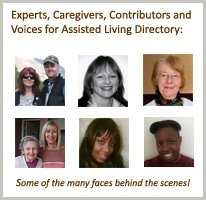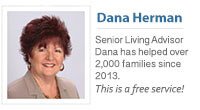Part 1 of 3: Defining Help: Caregivers need help but it seems to be very elusive!
Part 1 of 3: Defining Help: Caregivers need help but it seems to be very elusive!

Summary: From her years of experience in caring for her disabled brother Robert, Trish exlpores the all-too-common complaint from caregivers that they can’t find any help, and how “help” can be defined, and categorized in a number of ways.”Help comes in all shapes and sizes but usually doesn’t come with a neon sign….”
Author: Trish Hughes Kreis exclusively for Assisted Living Directory
One of the main complaints I hear from other caregivers is they can’t find help: my siblings won’t help, my friends have disappeared and government agencies won’t help or are too difficult to figure out if they have any help to give.

Caregivers need help but it seems to be very elusive!
I have been fortunate in that I do have a lot of help. My husband, Richard, is a huge help with my disabled brother, Robert. My other brother helps, my daughter helps and I have strengthened existing friendships and gained new friends not lost them. I have even found help through government agencies.
I am extremely grateful for the abundance of help I have.
However, it occurred to me that a lot of this help has to do with how I define help, if I recognize help when it comes and if I accept the help. In this first of a three-part series, we will explore the very complex issue of “help.”
Help means different things in different situations. When Robert was spiraling downward in a recent decline, I knew I needed help but wasn’t sure exactly what help I needed. Did I need someone to come in to assist with personal care? Did he need placement in a facility where more skilled nursing help would be available? Has a doctor not recognized something that is going on with him and do we need another doctor to help? Will new medications or an adjustment of his old medications help?
Sometimes our expectations of help are pretty grandiose. We want our caree to be cured or we want the present problem to be solved immediately. I knew I needed help but thought things would always be this way so thought help was only going to come in the form of respite or placement. As it turns out, help came as a hospital stay, a new diagnosis, new medication, adjustment of present medications, various therapies and an extended stay in a Skilled Nursing Facility before returning home.
Help comes in all shapes and sizes but usually doesn’t come with a neon sign. Here are just a few ways to define help:
- Help from a friend. A friend might be someone who brings over dinner or someone who is available in an online support group. A friend can share a cup of coffee, lend a listening ear or make us giggle from thousands of miles away. The boost a friend can give a caregiver cannot be underestimated.
- Help from a relative. A relative might be able to offer a different perspective on a situation. For instance, it is difficult to gauge the magnitude of a decline when measured day to day. The decline may be dramatic to someone who visits every couple of months. This observation can be a huge help to the primary caregiver, caree and the doctor and can make a difference when creating the care plan.
- Help from Therapy. Occupational therapy, physical therapy, counseling or psychotherapy all count as help. One of the best solutions given to us by an Occupational Therapist has been elastic shoelaces. Robert gets to wear shoes that tie which is what he likes but the shoelaces never come undone.
- Help from Assisted Devices. Wheelchair, walker, non-skid socks, urinal guard, briefs (that work!), bed pads, hospital gowns, transfer pole, Hoyer lift, disinfectant wipes, latex-free gloves, clothing protectors, hospital bed, shower chair, grab bars, Velcro close shirts and pants and belts. It is such a relief when something as simple as a hospital gown makes nighttime dressing and changing easy.
- Help from the Doctor. Having a doctor who genuinely considers him/herself on the care team makes a huge difference. These doctors are the ones who keep digging for a diagnosis, for effective treatment and who will admit when they are wrong. This kind of help is like a warm blanket at night creating a sense of calm and security.
- Help from the Caree. Even the person being cared for can be of help. Cherish the one day they can put on their socks (they might not be able to do so again for months but that one day is now a cherished memory).
- Help from Respite. Not everyone has the good fortune to have paid respite (the Veteran’s Administration or Regional Centers for the disabled are two that have paid respite programs). Respite, whether for as long as a week or two or as little as an hour, can be rejuvenating.
- Help from Benefits. Find out as much as possible on benefits available through the caree’s health insurance. Read the Medicare book that is distributed annually. Ask the hospital discharge planners what help is available upon discharge. Become an expert at finding all the help the caree qualifies for and take advantage of it.
- Help from a Paid Caregiver. Not everyone has the option of this help but hiring short-term help through an agency is something to consider. Even hiring a housekeeper every now and then is helpful and can free up time to take care of other tasks or just take a break. Even trading services with a neighbor or friend not only frees up time but is easy on the bank account.
- Help from Websites. Take advantage of the Health and Human Services websites in each state to check on services available in your area. Seek out caregiver support websites to connect with other caregivers as well as websites (such as Assisted Living Directory) for help in finding an assisted living solution.
Any of these can be thought of as help but the individual caregiver is the one who has to define the help that is needed and what will be useful. As a caregiver, it is important to explore all possibilities of help and not get stuck thinking of help as “that one big thing.”
The second part of this series is on recognizing help
Responses to this article:
Mary-Jane Horvat Wrote:
So well done and so true. Caregiving is an enormous job. My advice is always accept help when it is offered and seek it when it isn’t offered. I especially appreciated the comment that even the caree can help. Indeed! Even if the task isn’t done to your standards, hopefully it eases your burden somewhat. I used to let Gary “Swiffer” and then when he napped I would re-Swiffer! He usually got at least half of the dust and dirt up!
6 February 2015 at 11:47 am
Richard Wrote:
Excellent article, I ca not wait to read number two. You are so right, help comes in many shapes and form many locations. Searching online and finding other caregivers and asking them where the obtain help is a big one, that and finding federal, state and county web sites are important. Great job Trish, please keep them coming.
5 February 2015 at 2:51 pm
No Obligation
Assisted Living with Part 1 of 3: Defining Help: Caregivers need help but it seems to be very elusive!





